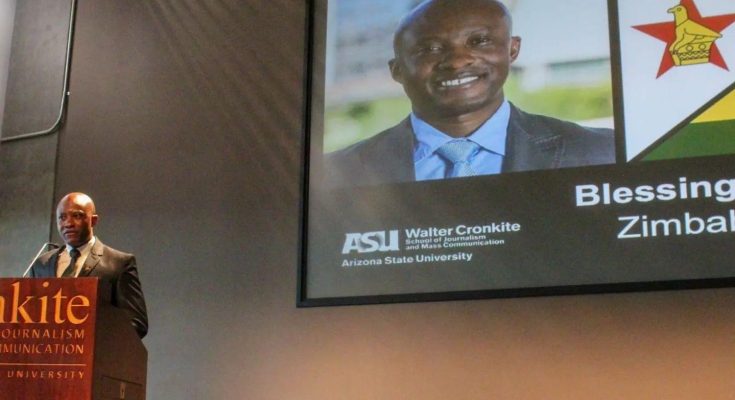I have a confession.
I was catapulted into applying for the Humphrey Fellowship because of deep-seated frustration and jealousy. When a former student of mine, who is now one of my colleagues, graduated with a Ph.D. and was promoted to senior lectureship because of his many publications in peer-reviewed journals, I lost my marbles.
It is crazy, right? I mean, as his former lecturer, I should have celebrated that my former student had scaled greater heights because, in a way, his success also indicated the brilliance of the lecturers who had groomed him, myself included. Understandably, my sentiments were not directed at his achievements. They rested purely on the realization that I had failed to upgrade myself. At my university, a lecturer who does not get a Ph.D. is like a soldier who remains in a low rank despite his years of service.
My intense emotions resulted in me isolating myself from my colleagues. I dropped most of the projects I had been part of and even refused to stand for re-election as the lecturers’ union’s Secretary General. “How is it that a former student, who was just a young boy when I taught him, has achieved so much ahead of me while I remain in the same position?” I asked myself. Unbeknown to me, my journey to essentialism had begun by isolating myself and asking this critical question. What is essentialism? The answer is simple. Essentialism is an aspirational philosophy hinged on the mantra that “Less is better.” It is the belief that instead of heading out in different directions, chasing after numerous pursuits, or working on multiple projects, one should choose a few crucial activities that they can fully concentrate on and contribute highly to so they may truly succeed and make an impact in life.
Greg McKeown explained this philosophy well in his book Essentialism: The Disciplined Pursuit of Less. Professor John Misner, the Humphrey Seminar leadership class lecturer during the 2023 Spring Semester, introduced this book to all Arizona State University (ASU) Humphrey Fellows. Through my attendance in Professor Misner’s class, I began to reflect on my lack of success and elevation. In his book, McKeown gives an example of one of the wealthiest guys on earth, Warren Buffet. He says Buffet made his money not because he invested in many companies but because he chose very few companies that were doing very well and invested a lot of money there. Warren became rich because he selected an essential or significant few from the trivial or not-so-great many. Less is much better = essentialism. A nonessentialist is a Jack of all trades and a master at none. Nonessentialists believe that they can do more than one thing at once. They say, “I can do it all.” However, they are thinly spread out and do not explore each project or task to its full potential. They rarely excel in anything.

Back to my story: While I was in isolation, wallowing in frustration and jealousy, I had a chance to introspect on my predicament deeply. I realized that I had spread myself too thin all these years and ended up being a jack of all trades and a master of none. When my department needed someone to work on a broadcasting license application so my university could establish a campus radio station, I was roped into that project and found myself with loads of work to do. At the same time, I was also busy trying to craft a new film production and visual effects degree program that I was supposed to submit to higher authorities for approval. Then came the inaugural 2021 Varsity Film Expo, whose steering committee I found myself chairing at the insistence of superiors in my department and faculty. My superiors’ insisted that film production was my line of work and that no one else could chair the committee. Well, it seems like, in all the tasks I eventually took up or ended up being assigned to me, it was because no one else could do them. Being the nonessentialist that I was, I took up more and more responsibilities at the expense of my professional development.
When I shut myself away from the ‘world’ after my former student and colleague graduated with a Ph.D. and got promoted, this solitude made me think about my life and the direction I wanted to take. Had I already come across McKeown’s book, I would have realized that this is the part where he quotes Pablo Picasso saying, “Without great solitude, no serious work is possible.” My solitude became that escape, which made me think deeply about what and where I wanted to be. I created space to think, read and explore opportunities. Within all the noise that surrounded me, I developed an art of listening and scanning for information that would be useful to me. That is when I came across the Humphrey Fellowship.
Some lecturers at NUST were making noise about this fellowship. They were dismissing it as a useless non-degree program, which would not result in anyone getting a Ph.D. place and a scholarship at an American university. They were abandoning the Humphrey Fellowship in preference for the Fulbright Scholarship, which resulted in the winner of the award being placed at a U.S. university for a complete Ph.D. program, with total tuition funding and upkeep stipends allocated to them. I looked past all this noise and decided that the Humphrey Fellowship would open other doors for me. To cut a long story short, I concentrated on my Humphrey Fellowship application. I was selected, together with two others, from about a thousand Zimbabwean applicants. Since taking up the Humphrey Fellowship, another big door has opened for me, a story for another day.
McKeown highlights, “The essentialist deliberately distinguishes the vital few from the trivial many, eliminates the nonessentials, and removes obstacles so that essential things have a clear, smooth passage.” There is truth in this because had I not isolated myself, backtracked on multiple projects, and chosen to mainly focus on applying for the Humphrey Fellowship; I would not have been where I am today.

In the past, I had been a nonessentialist who tried to do everything simultaneously. I had no power to say “No” when requested to carry out specific tasks, even when I knew I was already under pressure from other ongoing projects. An example is that I enrolled for a Ph.D. at the University of KwaZulu Natal in South Africa. Still, I failed to get past the proposal stage because, at the same time that I had been trying to do my studies, I had been trying to establish a campus radio station. Also, I had been crafting a new film production degree; representing lecturers in labor-related matters across various platforms as the Secretary General of their union; executing community service projects for my university, and trying to be there for my family, friends, and Church; to mention a few. Because of all these responsibilities I had piled up for myself, I became a thinly spread-out nonessentialist, a rolling stone that gathered no moss.
Even though I was very well known, did everything, and was found everywhere, I did not excel in any one specific matter. I was an example of what McKeown says in his book that nonessentialists divide their energy into many different activities, resulting in an unfulfilling experience of making a millimeter of progress in a million directions, and they end up frustrated. Compared to me, my colleagues who relinquished many departmental and faculty activities, choosing to direct their attention to a few vital activities, did exceptionally well in their academic careers. McKeown says that essentialists excel because they understand the concept of trade-offs. According to McKeown, “Strategy is about making choices or trade-offs. It is about deliberately choosing to be different.”
While many problems always need to be solved, essentialists exercise their freedom of choice by asking themselves, “Which problem do I want?”. While nonessentialists fail because they want to do everything and solve every problem, essentialists succeed because they know when to say “No!”. They understand the trade-off concept and logic: “Saying yes to any opportunity by definition requires saying no to several others” (McKeown, 2014, p.52).
The concept of essentialism is quite enlightening, and I have decided not to let other people create priorities for me. Concerning freedom of choice vis-à-vis the power of bosses who confer tasks and determine what is essential to subordinates, essentialism becomes a bit elusive. Professor John Misner suggests that when a boss begins to pile up tasks on you, you should politely accept them but then go on to ask the boss to advise you on the assignments that you should ‘park’ for a while for you to attend to the latest ones they have given you. He says that this question should make your boss realize how thinly spread out you are. During my journey to essentialism, I will certainly follow this advice.





